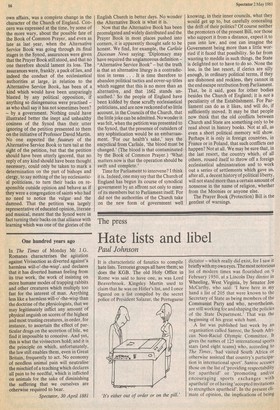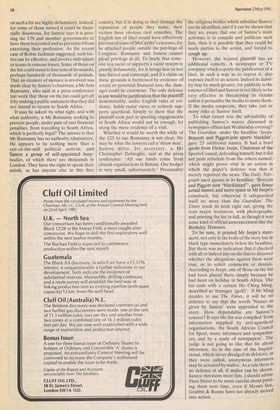The press
Hate lists and libel
Paul Johnson
It is characteristic of fanatics to compile hate lists. Terrorist groups all have them; so does the KGB. The old Holy Office in Rome was said to have one, as was Lord Beaverbrook. Kingsley Martin used to claim that he was on Hitler's list, and I once figured on a list compiled by the secret police of President Salazar, the Portuguese dictator — which really did exist, for I saw it briefly with my own eyes. The most notorious list of modern times was flourished on 9 February 1950, at a Lincoln Day dinner in Wheeling, West Virginia, by Senator Joe McCarthy, who said: 'I have here in my hand a list of 205 that were known to the Secretary of State as being members of the Communist Party and who, nevertheless, are still working for and shaping the policies of the State Department.' That was the beginning of his great witch hunt.
A list was published last week by an organisation called Sanroc, the South African Non-Racial Olympic Committee. It gives the names of 125 international sports stars (and eight teams) who, according to The Times, 'had visited South Africa or otherwise assisted that country's participation in international sport'. Sanroc accuses those on the list of 'providing respectability for apartheid' or 'promoting and/or encouraging sports exchanges with apartheid' or of having 'accepted invitations to strengthen apartheid'. In the present climate of opinion, the implications of being on such a list are highly defamatory. Indeed, for some of those named it could be financially disastrous, for Sanroc says it is pressing the UN and member governments to have them boycotted and so prevented from exercising their profession. As the recent case of Robin Jackman suggested, such tactics can be effective, and involve individuals or teams in ruinous losses. Some of those on the list could stand to lose tens of thousands, perhaps hundreds of thousands of pounds. That an element of menace is involved was 'made clear by Sanroc's chairman, a Mr Sam Ramsamy, who said at a press conference last week that those on the list could get off it by making a public statement that they did not intend to return to South Africa.
It may be asked: by what right, and with what authority, is Mr Ramsamy seeking to prevent people, under pain of vast financial penalties, from travelling to South Africa, which is perfectly legal? The answer is that Mr Ramsamy has no authority whatsoever. He appears to be nothing more than a run-of-the-mill political activist, and Sanroc a group of self-appointed busybodies, of which there are thousands in London. They have the right to speak their minds, as has anyone else in this free country, but if in doing so they damage the reputation of people they name, their victims have obvious civil remedies. The English law of libel would have effectively prevented some of McCarthy's excesses, for he attacked people outside the privilege of Congress. Ramsamy and Sanroc cannot plead privilege at all. To imply that someone is a racist or supports a racist system is plainly defamatory, for it brings him or her into hatred and contempt, and if a claim oni these grounds is buttressed by evidence ofl actual or potential financial loss, the damages could be enormous. The only defence in law would be justification that the plaintiff demonstrably, under English rules of evidence, holds racist views or actively supports apartheid. Simply to show that the plaintiff took part in sporting engagements in South Africa would not be enough, let along the mere evidence of a visit.
Whether it would be worth the while of the 125 to sue Ramsamy is not clear. He may be what the lawyers call a 'straw man'. Sanroc ditto. Its secretary, a Mr Christopher Debroglio, said at the press. conference: 'All our funds come from church organisations in Britain. Our budget is very small, unfortunately.' Presumably. the religious bodies which subsidise Sanroc can be identified, and if it can be shown that they are aware that one of Sanroc's main activities is to compile and publicise such lists, then it is possible that they could be made parties to the action, and forced to cough up.
However, the injured plaintiff has an additional remedy. A newspaper or TV company which reports the publication of a libel, in such a way as to repeat it, also exposes itself to an action. Indeed its liability may be much greater, for publicity is the essence of libel and Sanroc is not likely to be very effective in threatening its victims unless it persuades the media to name them. If the media cooperate, they take just as many risks as Sanroc itself.
To what extent was the advisability of publishing Sanroc's names discussed in newspaper offices last Wednesday evening? The Guardian. under the headline 'Jeeps. Boycott and Piggott join sports blacklist', gave 25 additional names. It had a brief quote from Dickie Jeeps, Chairman of the Sports Council, defending himself, but it did not print rebuttals from the others named, which might prove vital in an action in which the paper's defence was that it merely reported the news. The Daily Telegraph used quotes in its headline: 'Boycott and Piggott now "blacklisted", gave fewer actual names, and more space to MrJeeps's comeback, but otherwise it safeguarded itself no more than the Guardian. The Times stuck its neck right out, giving the item major treatment, with photographs, and printing the list in full, as though it was some kind of official announcement like the Birthday Honours.
To be sure, it printed Mr Jeeps's statement, not only in the body of the story but in black type immediately below the headline. But there was no indication that it checked with all or indeed any on the lists to discover whether the allegations against them were true, or to solicit comments or denials. According to Jeeps, one of those on the list had been placed there simply because he had been on holiday in South Africa. The list ends with a certain Ho Ching Ming, described as 'manager (golf)'. If Mr Ming decides to sue The Times, it will be no defence to say that the words 'Names as given by Sanroc' were appended to the story. How dependable are Sanroc's sources? It says the list was compiled 'from information supplied by anti-apartheid organisations, the South African Council for Sport, many informers and sympathisers, and by a study of newspapers'. The judge is not going to like that bit about informers. As in the case of the Inquisitional, which never divulged its delators, as they were called, anonymous informers may be actuated by malice. As a rule there is no defence at all, if malice can be shown. Sanroc threatens more lists. I should advise Fleet Street to be more careful about printing them next time, even if Messrs Sue, Grabbit & Runne have not already moved into action,



















































































 Previous page
Previous page